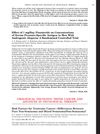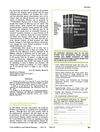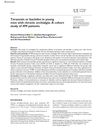67 citations,
January 1987 in “The Journal of urology/The journal of urology” New hormonal therapies can help treat advanced prostate cancer but may cause testicular issues.
 May 2023 in “Frontiers in Endocrinology”
May 2023 in “Frontiers in Endocrinology” Blocking CRF1 receptors improved male hormone levels and reduced testicular tumor size in men with a specific adrenal condition.
[object Object]  July 2019 in “Acta Scientiae Veterinariae”
July 2019 in “Acta Scientiae Veterinariae” Removing a testicular tumor in a dog reduced its aggressive behavior and skin problems.
 May 2007 in “The Journal of Urology”
May 2007 in “The Journal of Urology” Finasteride lowers PSA levels in men, certain factors increase testicular cancer risk, and current guidelines for penile cancer may lead to unnecessary surgeries.
 August 1978 in “Dicp-The annals of pharmacotherapy”
August 1978 in “Dicp-The annals of pharmacotherapy” Mannitol diuresis allows higher doses of cis-platinum for testicular cancer treatment without increasing kidney damage.
 5 citations,
May 2012 in “Andrologia”
5 citations,
May 2012 in “Andrologia” Finasteride use may be linked to rare testicular tumor, but more research needed.
 2 citations,
February 2020 in “Rivista Urologia”
2 citations,
February 2020 in “Rivista Urologia” Both terazosin and baclofen effectively reduce pain in young men with chronic testicular pain, with no difference in their effectiveness.
January 2016 in “AACE Clinical Case Reports” Treatment restored normal sexual characteristics and blood condition in a patient with testicular cancer.
 104 citations,
May 2019 in “F1000Research”
104 citations,
May 2019 in “F1000Research” Losing weight, fixing varicoceles, and using advanced sperm selection methods improve male infertility treatment outcomes.
 72 citations,
October 1998 in “Baillière's clinical endocrinology and metabolism”
72 citations,
October 1998 in “Baillière's clinical endocrinology and metabolism” Long-term testosterone therapy can cause hormone suppression, affect prostate and heart health, and alter physical characteristics, but does not increase prostate cancer risk and needs more research for full risk assessment.
 57 citations,
February 1983 in “The Journal of clinical endocrinology and metabolism/Journal of clinical endocrinology & metabolism”
57 citations,
February 1983 in “The Journal of clinical endocrinology and metabolism/Journal of clinical endocrinology & metabolism” Dihydrotestosterone increases the activity of an enzyme in pubic skin cells that converts testosterone to dihydrotestosterone.
 55 citations,
July 1999 in “Clinics in Sports Medicine”
55 citations,
July 1999 in “Clinics in Sports Medicine” Athletes use steroids to enhance performance despite health risks and legal issues, and education on their dangers is needed.
 42 citations,
April 2013 in “Steroids”
42 citations,
April 2013 in “Steroids” Non-classic congenital adrenal hyperplasia is a common disorder causing symptoms like acne and infertility, and it's managed based on symptoms, not just test results. Treatment can improve fertility and reduce miscarriage risk.
41 citations,
April 1997 in “Fertility and sterility” Clomiphene citrate can reverse low hormone levels and symptoms in male runners with hypogonadotropic hypogonadism.
37 citations,
February 2010 in “Psychoneuroendocrinology” Androgen self-administration might be controlled by membrane receptors, not nuclear ones.
 30 citations,
June 2012 in “Current Opinion in Endocrinology, Diabetes and Obesity”
30 citations,
June 2012 in “Current Opinion in Endocrinology, Diabetes and Obesity” Nonclassic congenital adrenal hyperplasia is a genetic disorder causing hormone imbalances, affecting fertility and requiring personalized treatment.
 29 citations,
December 2012 in “Current Opinion in Endocrinology, Diabetes and Obesity”
29 citations,
December 2012 in “Current Opinion in Endocrinology, Diabetes and Obesity” With careful management, people with congenital adrenal hyperplasia can have successful pregnancies and become parents.
29 citations,
July 2011 in “Pediatrics in review” Accurate assessment of puberty using Tanner staging is crucial for identifying normal and abnormal development.
 26 citations,
October 2014 in “Andrologia”
26 citations,
October 2014 in “Andrologia” Infertile men are more likely to produce sperm with abnormal chromosome numbers, which can affect pregnancy success and embryo health.
24 citations,
July 1980 in “Journal of Toxicology and Environmental Health” High doses of norethindrone acetate in rats caused various organ changes but didn't significantly increase tumor rates.
 23 citations,
September 2021 in “Frontiers in Cellular and Infection Microbiology”
23 citations,
September 2021 in “Frontiers in Cellular and Infection Microbiology” Testosterone's effects on COVID-19 are unclear and need more research.
 23 citations,
February 2021 in “Journal of Endocrinological Investigation”
23 citations,
February 2021 in “Journal of Endocrinological Investigation” Betacoronaviruses, like COVID-19, may cause hormone system dysfunction and affect disease susceptibility and severity.
 18 citations,
June 2009 in “Journal of Molecular Endocrinology”
18 citations,
June 2009 in “Journal of Molecular Endocrinology” Finasteride exposure harms tadpole reproduction and hormone balance.
 17 citations,
May 2021 in “Journal of Assisted Reproduction and Genetics”
17 citations,
May 2021 in “Journal of Assisted Reproduction and Genetics” COVID-19 may harm male fertility and damage the reproductive system.
 16 citations,
July 2012 in “The New England Journal of Medicine”
16 citations,
July 2012 in “The New England Journal of Medicine” The patient was diagnosed with anorexia nervosa and severe malnutrition, requiring urgent refeeding and monitoring.
 12 citations,
January 2016 in “Endocrinology, diabetes & metabolism case reports”
12 citations,
January 2016 in “Endocrinology, diabetes & metabolism case reports” Testosterone therapy improved physical and social health in a male with 49,XXXXY syndrome.
 9 citations,
March 2021 in “Hormones”
9 citations,
March 2021 in “Hormones” COVID-19 may affect male fertility and women might have better outcomes due to hormonal and immune differences.
 9 citations,
March 2019 in “European Journal of Sport Science”
9 citations,
March 2019 in “European Journal of Sport Science” New signs like changes in blood markers, physical symptoms, and behavioral shifts may help detect hidden steroid use in athletes.
 7 citations,
May 2015 in “General and Comparative Endocrinology”
7 citations,
May 2015 in “General and Comparative Endocrinology” Finasteride negatively affects fish reproduction and gonadal development.
[object Object] 5 citations,
July 2019 in “Nutrients” Low selenium intake may delay puberty in boys but not in girls.






















